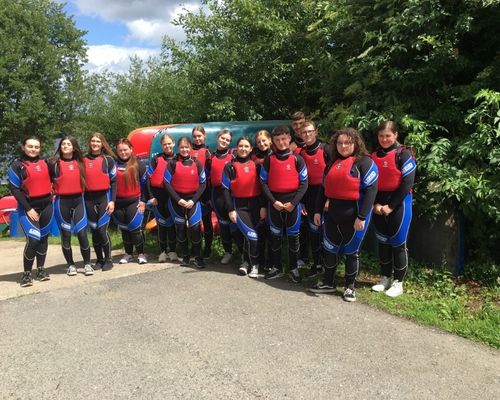The school’s approach places Welsh naturally at the heart of school life. The overarching strategy reflects the national mission in making Welsh available for all, focussing on a deep sense of belonging through lifelong use of the language and promoting customs and traditions. Pupil voice is used effectively to develop the use of Welsh, Welsh history and heritage across the whole school community. The ‘Criw Cymraeg’ represents all year groups, backgrounds and abilities and a Welsh society ‘Cymdeithas Cymraeg Pen Y Dre’ has been set up for all staff and ex pupils to support their ‘cynefin’.
Real life contexts are skillfully used. These include:
- Co-ordinating the cluster Eisteddfod, this involves current and past pupils at the school organising and running the day for the primary schools. Pen y Dre pupils can practise their Welsh speaking skills as they lead the day and primary pupils gain valuable opportunities to perform through the medium of Welsh.
- Bi-weekly visits to the school by the local Urdd Officer, working with Year 7 and Year 11 groups. In addition, pupils complete termly projects focused on developing oracy skills with the local Menter Iaith Youth Development Officer and perform in Welsh at multiple locations across the borough on St David’s Day.
An established Eisteddfod Club with representation from all year groups. The group practise daily and compete in Local Eisteddfods on weekends across South Wales, as well as the annual Urdd National Eisteddfod.

- Enjoying regular visits to important areas from Welsh history such as Senghenydd, Aberfan, Cilmeri, Bannau Brycheininog, Yr Ysgwrn, Eryri and Tryweryn in order to build upon their classroom learning of events associated with these places. The pupils make bilingual information films following the visits and these resources have been shared for use by all schools across Wales.
Using Welsh as a natural part of the school’s Duke of Edinburgh Award Scheme provision.


- Leading a weekly after school bilingual sports club for Year 4-6 pupils from across the Pen Y Dre partner primary schools, in collaboration with Chwaraeon Yr Urdd.
- Whole school and community celebration of events including Welsh Music Day, St Dwynwen’s Day, St David’s Day, Owain Glyndŵr Day and Diwrnod Shwmae Su’mae.
- Working with key external partners such as the Urdd, Menter Iaith and S4C.
An important aspect of the approach is the close relationship between the Welsh and expressive arts faculties. The expressive arts support pupils in preparing for Eisteddfodau and enabling them to compete in drama, recitation, musical and dance performances along with oracy, literacy, film making and arts and crafts work. Pupils’ enjoy the activities and have gained confidence, they regularly compete in Welsh first language as well as Welsh learner categories.The school creates Welsh-medium films and artwork along with Welsh medium public art exhibitions.
The school works with Welsh Government on strategies to support the 2050 one million Welsh speakers initiative across English medium education. They currently deliver two pilot schemes in collaboration with Welsh Government, the National Centre for Learning Welsh and the Say Something in Welsh company. The aims of both pilots are to change current provision and produce a far greater number of confident post 16 Welsh speakers from English medium settings.
Staff at Pen y Dre High School are happy to use incidental Welsh in their work, and actively seek out opportunities to develop Welsh language communication skills in both formal teaching activities and informal situations. There are weekly key words and phrases in Welsh to develop both pupil and staff competency in the use of Welsh, and several staff are learning Welsh via the ‘Eisiau Dysgu Cymraeg?’ course offered by the school.








